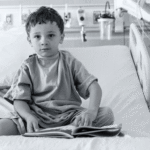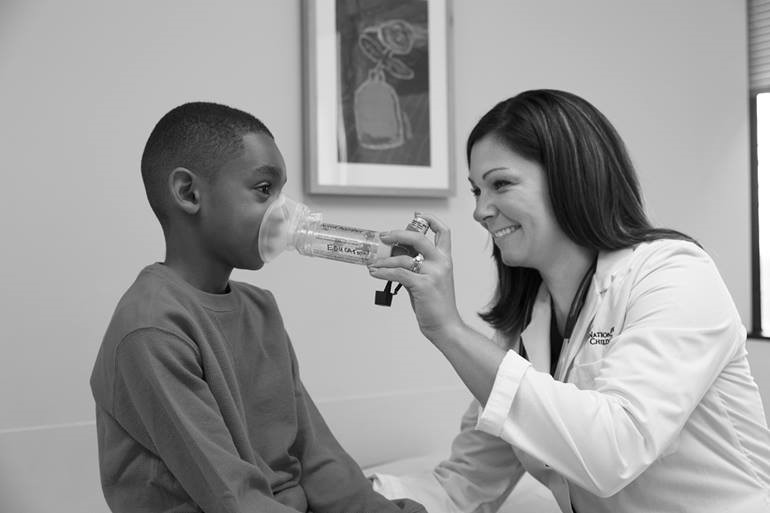Managing Depression, Anxiety and Other Behavioral Health Issues in Primary Care
Managing Depression, Anxiety and Other Behavioral Health Issues in Primary Care https://pediatricsnationwide.org/wp-content/uploads/2019/05/AdobeStock_91559062-header-1024x575.jpg 1024 575 Rachael Hardison Rachael Hardison https://pediatricsnationwide.org/wp-content/uploads/2021/03/Rachael-Hardison-bio.gif- August 02, 2017
- Rachael Hardison

An estimated 20 percent of children struggle with mental health illness. As awareness grows, the call for primary care physicians to play a leading role in care grows louder.
One in five children will struggle with a mental health illness by the age of 12, but a recent survey by the American Academy of Pediatrics revealed that only 47 percent of primary care physicians feel comfortable screening for and diagnosing mental illness.
Behavioral Health specialists at Nationwide Children’s Hospital are working with pediatricians to address this emerging need, including holding a recent workshop to educate community providers.
Depression — The Most Common Mood Disorder
The ability to distinguish a true disorder from normal mood states is important when working with children and adolescents, says Nadine Schwartz, MD, medical director of Outpatient Psychiatric Services at Nationwide Children’s. Depression is the most common mood disorder, occurring in up to 8 percent of teenagers and 2.5 percent of school-age children. Pediatricians should use depression screening tools such as the Preschool Feelings Checklist, the Pediatric Symptom Checklist and Youth Self Report for this population.
“After use of these screening tools, primary care providers should feel empowered to treat clear, uncomplicated depression,” says David Axelson, MD, medical director of Behavioral Health at Nationwide Children’s.
In some cases, however, depression will not be clear and uncomplicated. Approximately 1 percent of children will experience bipolar disorder, for example. Primary providers should be aware that these are not simple “mood swings,” as some parents and caregivers may call them.
“Episodes of mania or hypomania are the primary differentiators between depression and bipolar disorder,” says Dr. Axelson.
If a primary care physician suspects a child may have bipolar disorder, referral for psychotherapy should be considered before prescribing medication, because children at risk for bipolar disorder may react poorly to stimulants and antidepressants. Collaboration with behavioral health specialists is key, says Dr. Axelson.
“Be aware, let patients and families know the potential risks, and consult or refer if manic symptoms do occur during treatment,” he says.
Anxiety — The Great Masquerader
Although depression and anxiety often go hand in hand, it is critical to recognize anxiety disorders as a class of their own. One in four teenagers will experience an anxiety disorder in their lifetimes.
“Anxiety is the disorder that gets left behind, yet is far more common than any of the other [behavioral] disorders,” says Kristina Jiner, MD, an attending psychiatrist at Nationwide Children’s and associate professor in the Department of Psychiatry and Behavioral Health at The Ohio State University.
Primary care physicians should understand the many possible presentations of anxiety disorders in youth. While some children will have somatic symptoms, an anxiety disorder in other kids can manifest as a behavioral problem or disobedience. This may result in caregivers underestimating the severity of symptoms of an anxiety disorder.
The most common anxiety disorders in youth are specific phobias, separation anxiety disorder and social phobia. Other major anxiety disorders include generalized anxiety disorder, panic disorder and obsessive compulsive disorder. An excellent resource for primary care physicians is the Screen for Anxiety Related Disorders (SCARED), says Dr. Jiner. However, knowing which specific anxiety disorder a child has isn’t as important as knowing that there is anxiety present.
“Knowing which anxiety disorder you have is important from a therapy standpoint; it affects what is targeted,” she says. “From a medication management standpoint, it is more important that you know that there’s anxiety present than knowing which one of these specific disorders it is.”
A Primary Care-Friendly Toolbox
The panel specialists recommend using an algorithm to determine management and treatment options. In short, children with mild symptoms may simply need supportive care, while those with persistent or moderate symptoms may need referral to a cognitive behavioral therapist. For children with severe symptoms, medication may provide additional benefit.
The first line of medications for depression and anxiety disorders are selective serotonin reuptake inhibitors (SSRIs). Some families may be uneasy about trying medication, but Dr. Jiner emphasizes the importance of keeping the starting dose low, titrating up and watching for concerning side effects. Nationwide Children’s and Partners For Kids, an accountable care organization, have created this downloadable guide for prescribing behavioral health medication.
Aside from medication, Ohio’s Building Mental Wellness program and American Academy of Pediatrics chapters provide primary care offices with handouts to help discuss ways for caregivers to help manage depression and anxiety in children, such as an Anxiety Patient Action Plan.
A collaborative relationship between primary care physicians and behavioral health specialists will provide the most benefit to children struggling with behavioral or mental issues, says Rebecca Baum, MD, chief of Developmental and Behavioral Pediatrics at Nationwide Children’s.
“I love those phone calls from primary care providers because it’s an opportunity for me to provide a bit of education and consultation,” says Dr. Baum. “Maybe next time that patient won’t end up in my office and will be a lot happier receiving care in [a primary care] office.”
Resources:
Building Mental Wellness Learning Collaborative (Ohio AAP)
Ohio Psychotropic Medication Quality Improvement Collaborative
Nationwide Children’s Hospital Behavioral Health Physician Resources
Image credit: Adobe Stock
About the author
Rachael is a PhD candidate in Biomedical Sciences at The Ohio State University and is completing her graduate studies at The Research Institute at Nationwide Children’s Hospital in the Center for Microbial Pathogenesis. She contributes to Pediatrics Nationwide and PediatricsOnline, an online newsletter for specialists.
-
Rachael Hardisonhttps://pediatricsnationwide.org/author/rachael-hardison/
-
Rachael Hardisonhttps://pediatricsnationwide.org/author/rachael-hardison/
-
Rachael Hardisonhttps://pediatricsnationwide.org/author/rachael-hardison/
-
Rachael Hardisonhttps://pediatricsnationwide.org/author/rachael-hardison/
- Posted In:
- Clinical Updates
- Features









